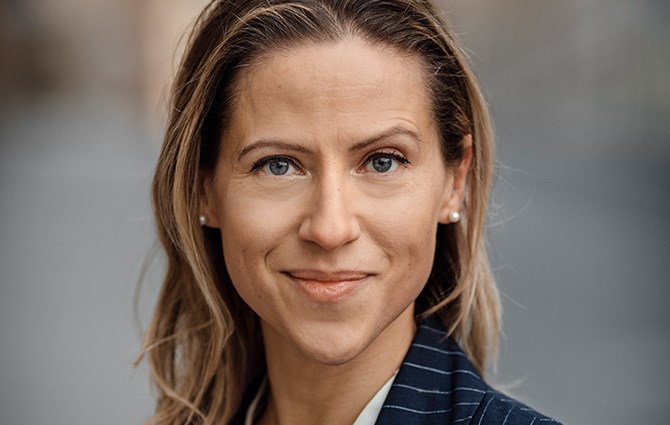Catharina Belfrage Sahlstrand on Sustainability in Finance
nov. 15, 2024
In this interview, Catharina Belfrage, Head of Sustainability at Handelsbanken and a member of the Swedish House of Finance (SHoF) Advisory Board, discusses the financial industry's climate goals, and the critical interplay between academic research and industry practices in advancing sustainable finance.

Can you describe your roles as Head of Sustainability at Handelsbanken and your involvement at SHoF?
The role of the Chief Sustainability Officer and team at Handelsbanken is to set and oversee sustainability goals and policies, coordinate and guide sustainability efforts, work with business development, report progress both externally and to our management, CEO, and board, and to anticipate new sustainability dimensions relevant to the bank and its customers.
Serving on SHoF's advisory board has provided access to dialogue and relevant research in fields such as sustainable finance, social finance, and ESG risks. It’s also allowed me to engage with SHoF researchers, students at the Stockholm School of Economics as a guest lecturer, and SHoF’s extensive network of scholars and market practitioners.
What are Handelsbanken's and the broader financial industry’s climate goals? What major challenges do you encounter while trying to meet these targets?
Handelsbanken’s climate goals focus on supporting our customers in managing and avoiding climate risks, thereby maintaining low risks for them, the bank, and society at large. These goals include aligning our lending and investment portfolios with the Paris Agreement, achieving net-zero emissions across all business areas and internal operations by 2040, and cutting emissions in our primary lending exposures—mortgages and real estate—by roughly half by 2030.
Much like other banks, our main challenge is that nearly all of our emissions are indirect, originating from when we extend credit to our customers or invest their savings. This requires broad and deep engagement from both corporate customers and homeowners to partner with us in taking action. Financial incentives and communication are therefore essential. Other challenges include data quality and market risks; it’s crucial that ongoing regulatory activities continue to guide climate investments to keep them competitive for customers and their banks.
How does research inform your work at Handelsbanken, and how do you think researchers benefit from engaging with industry practitioners?
Climate risks and the opportunities within climate action are complex, and understanding both the associated risks and financing decarbonization's market conditions is evolving. The same applies to other sustainability transitions. Given that the actions required transcend industries and societal sectors, collaboration between academia and industry practitioners is invaluable.
However, the exact impact of shared insights is not always evident in advance, and the outcomes often surpass expectations. My work has benefited both from research papers and from discussing climate and finance with SHoF researchers. I imagine input from industry practitioners, which highlights challenges and needs, helps inform researchers about which financial research areas would most benefit the financial system.
What gaps in sustainable finance research would you like to see addressed?
In the field of sustainability, research on the effectiveness of various financial incentives has been highly relevant. Further understanding of the relative effectiveness of financing options—such as sustainability-linked loans and green loans compared to measures like sustainability advisory and support for transition planning, particularly for companies in high-emitting or hard-to-abate industries—would be very valuable.
